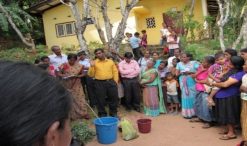
The Matale district in Sri Lanka is famous in the country for cultivating spices. In Kambiadiya village in Matale, most of the residents are also engaged in agriculture. Additionally, the women in the village are engaged in home gardening to help provide for their family needs. Their gardens are collectively referred to as “Kandyan Home Gardens”. Various crops including vegetables, fruits, coffee, spices, and cloves are cultivated in these gardens. The harvested crops are mostly for their own consumption, but if there are surpluses, these are then sold.
As the country was in full swing with the green revolutionary methods, using chemical fertilizers, pesticides, and herbicides became a common practice. Farmers received chemical fertilizer and a huge amount of subsidy. The farmers in Kambiadiya were no exception in employing pesticides and herbicides in their home gardens.
The women farmers of Kandyan Home Gardens became accustomed to using chemical fertilizers which they did not know threatened their health as well as the environment. It had been proven that the rampant use of chemical fertilizers is responsible for the chronic kidney disease (CKD). Cancer, heart diseases and high blood pressure Sri Lanka.
The women of Kandyan Home Gardens stepped forward and started to make changes by doing away with the dangerous practice of using chemical fertilizer in their gardens. They partnered with the Women’s Development Foundation (WDF), an organization that aims to provide a helping hand for women to improve their living standards.

The National President of LFF conducting field training 
Local organic matter for making liquid fertilizer
The WDF collaborated with the MTCP2 Program and Lanka Farmer Forum (LFF), which was initiated by MTCP2 program, and carried out several discussions and trainings which was participated by 35 women. Realizing the dangers of the chemical-oriented farming methods after several rounds of discussions, LFF and WDF conducted discussions on environment-friendly farming including how to collect, preserve, multiply, and share local/traditional seeds, how to prepare organic fertilizer, natural pest control methods, preparing live fences for multiple use, soil conservation methods, and ‘zero budget farming’ techniques.
As of the moment, about 40 women were able to start and maintain eco-friendly home gardens. They completely stopped using chemical fertilizers, pesticides, and herbicides. Additionally, some of the women farmers were able to influence their husbands to allot a portion of their farms in growing crops without using chemical inputs. As a result, a fair number of people living in the village are now able to buy organic vegetables and fruits from the farmers.

Farmer leaders in the village also participated in the Value Adding trainings organized by the LFF. From these trainings, they realized how they are being exploited by big business. They disseminated the information and the knowledge they learned among their members and started to act in this regard.
At first, most of the women were reluctant to join the value adding process because they had no experience on this. As a strategy, the women leaders proposed to give only a portion of their harvest for value adding and the rest is to be sold in bulks as usual.
Renuka, the leader of the women’s group, plans to extend these practices among another group of women and start a value added production using the surplus organic harvests. They have already explored the possibility of collecting spices they grow in their gardens and sell these in retail.
Now, they women farmers of Kambiadiya see a bright future in popularizing and marketing organic food such as vegetables, fruits, and even spices. They will soon come up with a farming plan in order to decide on the varieties and the volumes that each member should grow in order to cater to the diverse needs of the market and also to guarantee a fair income by not overproducing. ###
About MTCP2
The Medium Term Cooperation Program Phase 2 (MTCP2), a five-year capacity building program supported by the International Fund for Agricultural Development (IFAD), the Swiss Agency for Development and Cooperation (SDC), and the European Union (EU), has been implemented in 19 countries across three sub-regions—Southeast Asia, South Asia, and the Pacific—engaging 1,544 sub-national farmers organizations (FOs) with a total membership of around 22 million farmers.
The funding support (total budget of $ 5 million for the whole duration of the project across 19 countries) serves as a catalytic fund that will allow FOs to enhance their capacity to be effective channels of economic services to farmers.
So far, the program has contributed to the formation of strong national platform of FOs with improved capacity to engage in policy processes and mobilize resources from mainstream agricultural development programs like extension services, credit, and pre and post harvest facilities. The program also helped in transforming farmers associations into commodity-based cooperatives to strengthen the role of small-scale farmers within an inclusive and sustainable value-chain.
The program is being implemented by the consortium Asian Farmers’ Association for Sustainable Rural Development (AFA) and La Via Campesina (LVC).



Comments are closed